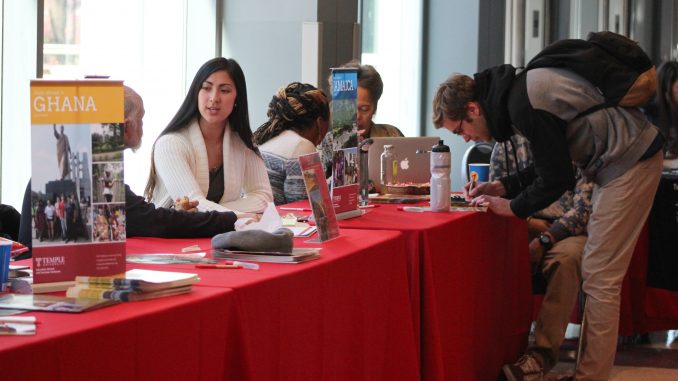
When Shanel Ledesma was preparing for her current study away program at Temple University Japan, she wondered how the Japanese people would react to her Dominican appearance, and whether she would find a group of people to whom she could relate.
“I was mostly concerned about my identity as a Latina,” said Ledesma, who is also a part of the LGBTQ community. “I also wondered about my values of individuality and acceptance, and if it would stand out when I came into contact with other people.”
Despite concerns that her identity would keep her from fitting in abroad, Ledesma, a sophomore film and media arts major, found several resources to prepare her for her trip. Her advisers, student blogs and YouTube videos were Ledesma’s greatest tools for preparing to go abroad, she said.
For some American LGBTQ students preparing to study abroad, traveling to a country like Japan, where 98.5% of the population is Japanese and same-sex relationships are not particularly accepted outside of Tokyo, it can be difficult to know where to start looking for support.
“My advice for LGBT students that are thinking about studying abroad is search for resources,” Ledesma said. “You might think there aren’t any, but you’d be surprised.”
Nikolas Kfoury, a senior general studies major with a history concentration, is a full-time student at TUJ. He used online resources to prepare for his travel.
Kfoury is the leader of TUJ Pride Alliance, an LGBTQ student organization at TUJ, and he recommends Rachel and Jun’s Adventures, a YouTube channel run by a married couple that tackles different topics about moving to and living in Japan. The channel served as his source for all the LGBTQ-related knowledge he was looking for before temporarily moving to Japan.
Once Kfoury moved to Tokyo in August 2014, he quickly made friends who helped introduce him to Japan’s queer community, he said. He suggested watching YouTube videos on LGBTQ culture in Japan or connecting with TUJ for resources before moving.
Kfoury said Japan’s culture is generally accepting of the LGTBQ community, but it’s also less visible.

“Japan isn’t an individualistic society,” he said. “Anything about an individual that isn’t the standard ‘norm’ is usually kept secret. Many Japanese citizens aren’t open to expressing their true sexual identities outside of the gay district.”
Ledesma said the district of Shinjuku Ni-chome in Tokyo, “is the equivalent of Philadelphia’s Gayborhood with LGBT businesses, bars, and shops.”
“Again, Japan has a very community-based culture,” she said. “Where there is a high level of respect, if not tolerance, of the people surrounding them.”
Belinda Christensen, a program manager in the Education Abroad and Overseas Campuses Office, said LGBTQ students planning to travel abroad should embrace the online resources provided on the office’s website’s “Prepare to Go” tab.
The office has partnered with programs like Diversity Abroad and supports organizations like International Lesbian, Gay, Bisexual, Trans and Intersex Association, which encourages LGBTQ students, students of color and students with disabilities to travel.
ILGA offers detailed maps of sexual orientation laws by country, including the severity of punishments for people who break those laws. In some countries, breaking sexual orientation laws is punishable by life imprisonment or death.
Popular study abroad programs for Temple students, like Japan, Rome, London and Spain, are all in countries in which same-sex couples can get married or same-sex sexual acts are decriminalized, or never were criminalized, according to ILGA’s maps.
Christensen said while online resources are some of the largest tools for students preparing to travel, advising is equally important.
“Not only are we here to talk about academics and student housing, but we’re here for student life-related questions as well,” she said. “Questions about the student’s identity, that might impact their decision on where to go, whether to study abroad and possibly their experience, and it’s best those discussions happen on a one-on-one basis.”
“There’s so many aspects of somebody’s choice on where to study abroad,” she added. “It’s so individualized. We have these general resources, but we invite students to come in and talk to us.”
Kfoury said any student should take the opportunity to travel abroad if given the chance.
“The development you can make within yourself is completely worth it,” he said. “You’ll be able to experience something completely new, whether it’s the country’s culture itself, or the queer culture within the country. The growth you get from an experience like this is unbelievable.”
Henry Savage can be reached at henry.savage@temple.edu.



Be the first to comment